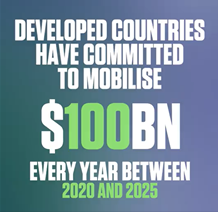New finance commitments made on Wednesday have led to significant progress towards the $100 (£73) billion goal per year set for developed countries, with 95% of the top 20 developed countries now having made pledges beyond 2020.
An updated compilation of the 2021-2025 climate finance commitments can be found here.

Over 450 banks, insurers and investors also pledged on Wednesday to put combating climate change at the centre of a collective $130 (£95) trillion at their disposal. This will be achieved through efforts to put green investing, science-based net zero targets and near term milestones, through the Glasgow Financial Alliance for Net Zero (GFANZ). The financial pledge through GFANZ is aimed at all assets managed by the institutions involved having net zero emissions by 2050.
This change in private sector financial institutions was praised by COP26 President Alok Sharma; "What we have seen over the last few years is a big move in the private sector and financial services sector to go green ... in the 1990s, clearly (then) climate finance, investing in green, was not mainstream. I do believe it is now mainstream."
Not everyone was as positive though, Sam Alvis, head of economy at the Green Alliance thinktank, said: “It is definite progress that the chancellor has got the Treasury on the pitch at Cop26. But trillions of dollars are still flowing to fossil fuels every day and voluntary measures have not got us far enough. To keep the 1.5 °C target alive, governments will need to regulate companies not just to publish transition plans but have strict criteria with legal bite on their credibility and pace.”
If the subject raised in this article is of interest to you, we also discuss it in some other parts of the website.













